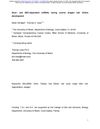TLDR Animal models help study psoriasis but have limitations and don't fully mimic the human disease.
The document reviewed various animal models used to study psoriasis, a disease not naturally occurring in laboratory animals. It covered transgenic, knockout, xenotransplantation, immunological reconstitution, drug-induced, and spontaneous mutation models in rodents, which are used to investigate psoriasis pathophysiology. The review acknowledged the utility of these models in understanding the disease and testing therapies but also pointed out their limitations, as they only partially reflect the human condition and have not been systematically validated. It highlighted the need for systematic validation and further research into the immunogenetic basis of psoriasis. The document also noted the challenges in comparing these models to human psoriasis due to differences like fibrosis in certain transgenic mice and the variability in disease severity influenced by environmental factors and gene dosage effects. It mentioned that no animal model perfectly replicates human psoriasis, with only sporadic cases observed in nonhuman primates, dogs, and pigs.
 59 citations
,
July 2015 in “Journal of Immunology”
59 citations
,
July 2015 in “Journal of Immunology” Certain proteins, caspases-1 and -11, are important in the early development of skin inflammation in mice.
 111 citations
,
November 2007 in “Clinics in Dermatology”
111 citations
,
November 2007 in “Clinics in Dermatology” Psoriasis skin changes are complex and might need several biopsies for a clear diagnosis.
150 citations
,
April 1997 in “Journal of Investigative Dermatology” 89 citations
,
March 1996 in “Proceedings of the National Academy of Sciences” CD18-deficient mice developed psoriasis-like skin disease, useful for studying inflammatory skin disorders.
265 citations
,
March 1993 in “The EMBO Journal” Keratinocyte growth factor significantly alters skin and tissue development.
221 citations
,
June 1992 in “Proceedings of the National Academy of Sciences” Interleukin 6 may help protect skin without causing inflammation.
409 citations
,
May 1991 in “Genes & Development” TGF-alpha affects skin thickness, hair growth, and may contribute to psoriasis and papilloma formation.
 276 citations
,
December 2017 in “Journal of Dermatological Science”
276 citations
,
December 2017 in “Journal of Dermatological Science” The document concludes that mouse models are helpful but have limitations for skin wound healing research, and suggests using larger animals and genetically modified mice for better human application.
3 citations
,
March 2022 in “The journal of investigative dermatology/Journal of investigative dermatology” Zebrafish are useful for studying and developing treatments for human skin diseases.
 1 citations
,
January 2020 in “bioRxiv (Cold Spring Harbor Laboratory)”
1 citations
,
January 2020 in “bioRxiv (Cold Spring Harbor Laboratory)” Dicer is crucial for hair growth in mice.
 50 citations
,
September 2011 in “Biochimica et Biophysica Acta (BBA) - Molecular and Cell Biology of Lipids”
50 citations
,
September 2011 in “Biochimica et Biophysica Acta (BBA) - Molecular and Cell Biology of Lipids” Maintaining the right amount of retinoic acid is crucial for healthy hair and skin.
40 citations
,
November 2021 in “International Journal of Molecular Sciences” Mutant keratins cause inflammation in Epidermolysis Bullosa Simplex, suggesting targeting them could help treat the disorder.




